- Home
- Sherry Thomas
The Magnolia Sword Page 7
The Magnolia Sword Read online
Page 7
The princeling pales, but he bows and leaves. I stare at his retreating back. Her ladyship sits down at the head of the room. She does not deign to look at me, but the force of her anger chokes all the air from my lungs. I can barely breathe.
The princeling returns with a shiny, black-lacquered case. He sets it down and lifts the lid.
Heart Sea!
No, not Heart Sea.
This sword is of the same dimensions as Heart Sea, its pommel decorated with the same fish-scale pattern. But instead of magnolia blossoms, the carving on its scabbard is of chrysanthemums.
Not until my fingers wrap around the handle do I realize that I have crossed the room. I have not asked for permission to unsheathe the sword, but I take the princeling’s silence as assent and draw out the blade.
The same unmistakable chill of menace; the same intricate checkerboard pattern. But instead of A Heart as Limitless as the Sea, its inscription reads
A BLADE THAT PIERCES THE SKY
This is Sky Blade, Heart Sea’s mate, which badly notched my practice sword half a month ago.
I look up at the princeling’s carefully blank expression. From the very beginning my instincts have drawn parallels between him and Yuan Kai. Each time, I’ve scoffed at myself, because sons of Xianbei royal dukes have no cause to be involved in such a hereditary duel.
“Now do you know who we are?” demands her ladyship.
Slowly I sheathe the sword and turn around to face her. “You are the Peng family.”
The Pengs and the Huas, rivals for far too many generations.
“The Peng family is no more,” she says coldly. “My father had neither brothers nor sons. He hoped to end the duels by uniting our two families. Your grandfather agreed to the match.”
I did not think I could be shocked again this day. “A match between …”
“Your father and myself.”
This woman could have been my mother? I quake at the thought.
“But your grandfather died before the match could take place, and your father reneged on the promise.”
I blink. Was that what Auntie Xia referred to as Father’s wild youth? His decision to break a matrimonial contract would have been considered a major breach of faith, and rightly so.
Her ladyship continues. “My father was already gravely ill. The news so angered him that he passed away two days later. No more wedding, but now there was once again a duel to fight. I would have faced your father, but a few days before the appointed date, I fell ill with a high fever that refused to come down. The physicians feared I would die. I thought the duel would be postponed, but without my knowledge, my sister took my place.”
This … seems possible. I always assumed that Father fought a man, but he never specified the gender of his opponent.
“My sister defeated him.” Her ladyship stares at me. “She defeated him.”
I thought that there was no clear winner—but I dare not correct this woman. “My father is paralyzed, your ladyship. I see that defeat every day of my life.”
“But do you know what he did to her?”
My gut tightens. Father’s opponent walked away unscathed, didn’t she?
It dawns on me that we are speaking of the princeling’s mother. I glance in his direction. He stands with his head bowed, his eyes on the floor, the imprint of his aunt’s hand vivid on his cheek. He is so tense that it’s a wonder he doesn’t break apart.
“I see Master Hua is looking at the son she left behind,” says fu-ren scathingly. “She died two days after the duel, not because your father was ever able to scratch her with his sword, but because he used hidden weapons.”
I recoil. Hidden weapons are not allowed in the duel, which is strictly a contest of swordsmanship. For Father to have deployed them would have been worse than dishonorable. It would have been appalling.
“The Huas weren’t satisfied merely to be great swordsmen. They wanted to learn about hidden weapons and the art of healing as well. Do you know what all that interest in herbs and substances led to?”
I see Father’s old library in my mind’s eye. In a hidden corner, there were scores of manuscripts dealing with …
“Poisons,” her ladyship continues inexorably, each word a kick to my temple. “The Huas were famous—and feared—not only for their swordsmanship but for their poisoned bronze lilies.”
My hands clench into fists. The only hidden weapons I have ever practiced with are all spherical in shape, without an edge anywhere. But long ago, in a silk pouch of such harmless metal balls, I found an intricate little device that looked like a miniature water lily, each paper-thin petal sharp as a knife’s edge. In my delight of discovery, I showed it to Father.
His alarm was so extreme he nearly toppled over. With shaking hands, he grabbed mine and examined them in minute detail while asking again and again whether the little metal flower had broken any skin. When he was at last reassured that I hadn’t been lacerated by the beautiful device, he whisked it away and warned me that if I ever came across one again, I was not to touch it.
I was never able to get any explanation from him as to why.
“Two bronze lilies struck my beloved sister, and she—” Her ladyship’s voice breaks. She inhales shakily. “And she died in extreme agony because your father possessed no honor. How perfidious can a man be, to break a matrimonial agreement—and then kill the woman who would have been his sister-in-law?”
It’s not true. None of it. It can’t be!
But the screams in my head are nothing compared to the pain etched across the face of the woman before me. The loss of her sister is still raw, her hatred of my father still seething.
She has no reason to tell lies about the broken engagement—one of the most humiliating misfortunes that can befall a woman. And would she really make up stories in front of her nephew about how his mother died?
Whatever happened, she believes deeply that she is telling the truth.
I have no idea what to believe anymore.
For a moment no one speaks. Her ladyship’s harsh breaths reverberate. Mine too, I realize dimly—I’m panting as if I have just pitted myself against a deadly foe.
“Auntie,” says the princeling quietly, “I didn’t get the chance to tell you, but Father has invited his esteemed visitors to stay for dinner. The heroes present will also attend. And he has asked that you please grace the gathering, as many of us will depart tomorrow morning.”
Her brows draw together. “Not you too. You’re leaving again so soon?”
“Yes, Auntie. My apologies.”
“But you’ve only just returned!” She grimaces and waves a hand. “No need to remind me that it is a time of war. I know.” He bows. “May I accompany you to your courtyard, Auntie?”
No doubt her ladyship must appear at the farewell dinner. But I’m sure the princeling’s greater purpose is to put some distance between her and me. I’m thankful that he will lead her away, but he should have never brought me here in the first place.
And never exposed me to this horrifying past that I cannot unhear or unlearn.
Her ladyship glares at me. “Remember, both swords should be in the hands of the winner. It was when my sister went to disarm your father that he ambushed her with hidden weapons. If you possessed any honor at all, you would surrender Heart Sea this moment.”
The hairs on the back of my neck rise. Is she going to forcibly seize my sword?
But she seems to have had all she can take of me. She turns back to her nephew, and for the first time I see a glimmer of tenderness in her eyes. “Let’s go.”
It isn’t until Xiao Yi timidly informs me that he is to conduct me to the banquet that I realize I am one of the “heroes” expected to take part.
He guides me to the middle hall, probably the grandest portion of the ducal residence, a standalone structure that can accommodate a hundred for New Year celebrations or other major occasions. I am placed at a table with several strangers, one of whom appears vaguely fam
iliar. A long moment passes before I recognize Captain Helou.
It feels as if I last saw him a decade ago.
Everything has changed. Everything has shattered.
Captain Helou slaps me on the back. “Hua xiong-di, where have you been? Here, meet the brothers I’m setting out with tomorrow. You should come too—we can always use skills as marvelous as yours!”
He introduces me to a Han Chinese man in his midtwenties named Bai, who recently entered the royal duke’s service. The other man, Kedan, is a distant relative to Captain Helou.
“You two grew up together, then?” asks Bai.
“Alas, I wasn’t so fortunate,” answers Kedan with an easy smile. “It would have made me a better man to have grown up alongside a true hero like Captain Helou.”
He goes on to explain how exactly they are related. I don’t hear much of what he says. It barely registers even when he mentions that though his clan belongs to the Xianbei now, they were originally Xiongnu.
Xiongnu, the Huns, were the great enemy of the Han Dynasty. I grew up listening to tales of their bloodthirstiness—Auntie Xia’s particular favorite concerned a Xiongnu prince who made a cup out of the skull of a conquered king. As a power, the Xiongnu have vanished, but the mere mention of them still sends a shiver up the collective spines of the Han Chinese.
Had I met Kedan at lunch, I would have responded to his ancestry with a clench of apprehension, if not a recoil of alarm. Now I feel almost nothing, my head too full of pandemonium to care about anything besides what happened on the day of that fateful duel.
In recent years, Father and I have not spent much time together outside my training routines. But once upon a time, it was different. We played games of go on the terrace overhanging Lake Tai. I punted him onto the lake at sunset to watch the sky turn pink and lilac. He recounted to me all the folktales he had heard during his youthful travels, and I listened to them again and again, basking in his knowledge of the world at large.
And all that time—my entire life—he has held back the truth, an omission as enormous as Lake Tai itself.
A commotion startles me: The royal duke and his family have arrived on the low dais at the front of the hall. The princeling seems to have two younger siblings, a sister and a brother. Next to the royal duke stands her ladyship. My skin scalds at her appearance, even as I grow cold inside.
The gathering rises. The guests salute the hosts. The royal duke, a broader, more rough-hewn version of his eldest son, thanks all the heroes present—is every man who can pick up a stick and fight a hero these days?—and introduces the guests of honor who will sit at the head table with his family. The men’s names and positions enter my hearing and leave immediately.
The royal duke speaks some more. Honor. Duty. Courage. Loyalty. Heaven. Earth. Gratitude.
Words. Just words.
The princeling glances at me, his face pale, his expression uncertain. Anger burns my throat: If it weren’t for him, I wouldn’t be crushed under the weight of all these revelations. But almost as quickly, my anger evaporates, leaving behind only a corrosive shame. Is my father really the kind of man her ladyship described? If so, then what am I, who have always yearned to make him proud?
The royal duke finishes his speech to thunderous applause. We all sit down. Food arrives within moments, platters upon heaped platters. Grain wine flows freely. I eye the amber fluid, tempted to drink myself into a stupor. But I am a woman in the midst of many men. As such, I don’t even have the luxury of behaving recklessly.
I almost change my mind when the entertainment begins. A troupe of musicians, singers, and dancers has been engaged to mark the occasion. Judging by the reactions of others in the hall, they offer a welcome diversion. But I see only chaos; I hear only cacophony.
Too many people, too much talking, too many rumbles of laughter. My head is in danger of cracking in two. My cheeks hurt from the effort of maintaining an interested half smile while the three men at my table chatter on and on.
Kedan, to hear his cousin-by-marriage Captain Helou tell it, is a famed hunter in the Greater Khingan, a mountain range far more northerly than any I’ve ever visited. Bai, to hear himself tell it, has led a life of exemplary uneventfulness and hopes to at last experience some excitement in this war.
Captain Helou gives an exaggerated account of my skills catching arrows. I have no choice but to return a similarly embellished version of his fight with the young soldier who didn’t know his place. Kedan knocks his cousin on the arm, his gaze full of admiration.
An eternity later, Captain Helou rises to use the facilities. Kedan wastes no time refilling everyone’s wine bowl, urging me to drink more.
“I’ve never been north of the Wall. I’ve never even been anywhere near the Wall,” says Bai, who doesn’t seem to have drunk any more than me, but already sounds a little tipsy.
Kedan, on the other hand, has been guzzling. But he is so alert and unaffected that he might as well have been tipping back tea all this while. “Nothing changes drastically at the Wall. It’s the same landscape, the same vegetation, the same climate whether you are north or south of it.”
“But a different country,” muses Bai. Then he waves his hand, as if there’s a fly buzzing before his face. “Eh, what does it matter what country I’m in? As long as I’m the kind of man with his feet on the ground and his shoulders against the sky.” “Hear, hear!” cries Kedan.
I’ve had enough. I’ve been waiting for Captain Helou to return so I could use my bladder as an excuse to leave the banquet. Now I decide it doesn’t matter whether he’s back or not. I mutter something and exit the hall.
Outside, the sharp teeth of the night air make me hiss, but my head throbs a little less.
As I near the first alley that branches out of the path from the middle hall, I hear Captain Helou’s voice. “… my life or my death I can serve my people, then I will not have lived or fought in vain.”
I want to roll my eyes but can’t. In fact, I’m filled with a searing envy for his conviction. I don’t know that I believe in anything anymore.
“We who remain in the capital are grateful, Captain,” says an unfamiliar voice. “The days ahead will be difficult.”
The war. Nothing about it seems remotely real or important at the moment.
Two men turn from the alley onto the path: Captain Helou and one of the duke’s honored guests, who is wearing some sort of ornament that jangles as he walks. I groan inwardly. I don’t want to speak to anyone else tonight, especially any elevated personage before whom I must act humble and reverential.
But I have no choice except to bow and salute. “Da-ren. Captain.”
I don’t remember the honored guest’s name or rank, but da-ren—important person—is a suitable catchall honorific.
“Hua xiong-di, I didn’t see you drink that much. You headed to the outhouse?” Captain Helou laughs a little. “Need me to show you where it is?”
“I’m just going to bed,” I answer, too worn-out to lie. “It’s been a long day and I can feel a headache coming on.”
“Sleep well, then, Hua xiong-di,” says Captain Helou. “Your headache will be gone by morning.”
“Thank you, Captain.” I salute again. “Da-ren, Captain, please take care.”
I remain in place until they walk off.
Back at the princeling’s courtyard, Xiao Yi rushes out. When he sees that it’s only me, he remains just as courteous, lighting the lamps in the east-facing suite, assuring me everything is in readiness for my rest, and begging me to please let him know if I need anything else.
When I’m finally alone, I slump down and clutch at my head.
My solitude does not last long: The princeling’s footsteps come into the courtyard. He knocks on my door. When I do not reply, he walks in. I continue to sit with my elbows on my knees, my face in my hands.
“Captain Helou told me you might not be feeling well,” he says quietly.
And Captain Helou is correct!
&nb
sp; I wish now that I’d become roaring drunk at the banquet. I wish the princeling’s aunt had not returned from her mountain retreat to see her nephew. I wish—
“Is it all true, what your aunt said?”
I hear him sit down across the room. “When I was in the South, I called on the referees who oversaw the duel between your father and my mother.”
Auntie Xia told me there is always a crowd of spectators at every duel. Most simply get wind of it and show up, drawn by the intrigue and excitement of a fierce contest. But a few are invited as observers and referees.
“The version of events my aunt had always related to me had been told to her by a referee named Master Zhuang. He said that when my mother went to take Heart Sea, the reward for her victory, your father, whom everyone believed to be already incapacitated, fired two bronze lilies at her in gross violation of the rules. But by the time of my sojourn in the South, Master Zhuang was already dead.
“The second of the three referees was still alive, but reluctant to say anything. But the third one, a Master Lu, said that he did not believe Master Zhuang had it entirely correct. Master Lu had been seated exactly opposite my mother as she approached your father, and he feared that instead of merely taking his sword, she meant to kill him. He was convinced that your father used hidden weapons out of self-preservation, not treachery.”
I wish he hadn’t told me this. Without corroborating evidence, I could still hope to deny everything. But now, even if this Master Lu’s account clears Father of murderous intent, it still confirms his killing of the princeling’s mother.
“Why did you visit the referees?” I manage after a while.
“For most of my life I believed my aunt to be an eyewitness at the duel. From time to time, the details of her story changed. I would ask her why that was so, and she would always tell me that I was the one who remembered wrong. And then one day, when I was fourteen, I learned that she hadn’t been there at all. That she had been at home, deliriously ill.”
Did that shock him as much as what I learned today shocked—and still shocks—me?
“Did you … did you tell your aunt what Master Lu said?”

_preview.jpg) Claiming the Duchess (Fitzhugh Trilogy Book 0.5)
Claiming the Duchess (Fitzhugh Trilogy Book 0.5)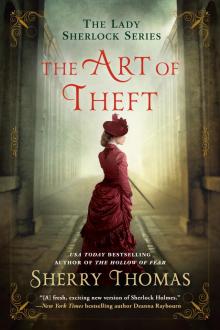 The Art of Theft
The Art of Theft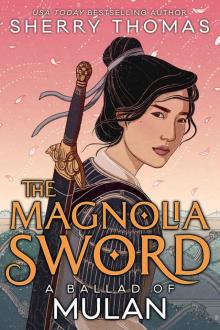 The Magnolia Sword: A Ballad of Mulan
The Magnolia Sword: A Ballad of Mulan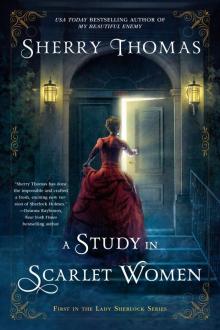 A Study In Scarlet Women
A Study In Scarlet Women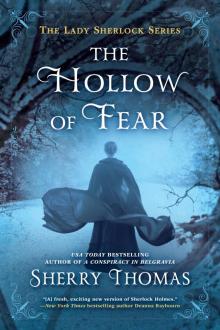 The Hollow of Fear
The Hollow of Fear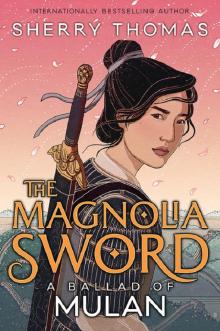 The Magnolia Sword
The Magnolia Sword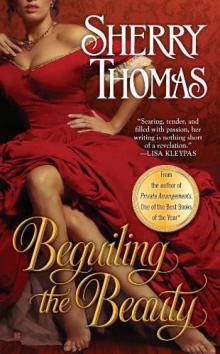 Beguiling the Beauty ft-1
Beguiling the Beauty ft-1 The Heart is a Universe
The Heart is a Universe The Hidden Blade: A Prequel to My Beautiful Enemy (Heart of Blade)
The Hidden Blade: A Prequel to My Beautiful Enemy (Heart of Blade)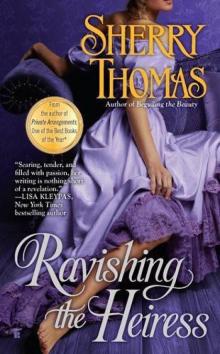 Ravishing the Heiress ft-2
Ravishing the Heiress ft-2 The Immortal Heights
The Immortal Heights The Hidden Blade
The Hidden Blade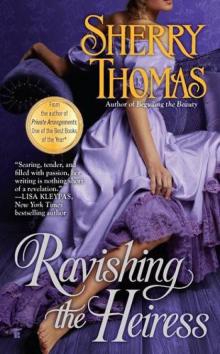 Ravishing the Heiress
Ravishing the Heiress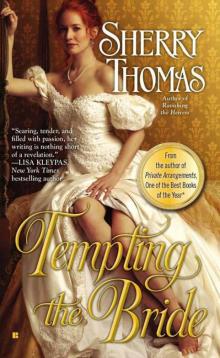 Tempting the Bride
Tempting the Bride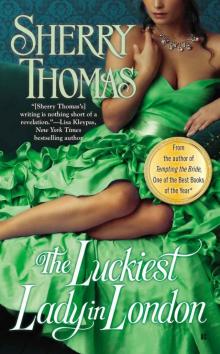 The Luckiest Lady in London
The Luckiest Lady in London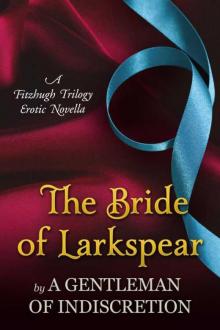 The Bride of Larkspear: A Fitzhugh Trilogy Erotic Novella
The Bride of Larkspear: A Fitzhugh Trilogy Erotic Novella Claiming the Duchess
Claiming the Duchess The One in My Heart
The One in My Heart His At Night
His At Night A Dance in Moonlight
A Dance in Moonlight A Conspiracy in Belgravia
A Conspiracy in Belgravia Not Quite a Husband
Not Quite a Husband